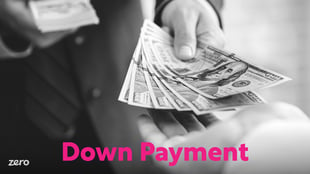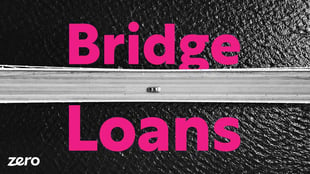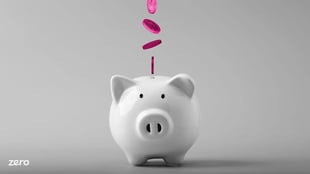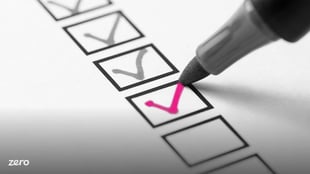What Is the Difference Between Interest Rate & APR?

Whenever you are borrowing money, whether it’s for a new mortgage, a refinance, credit card, or car loan, you’ll hear the terms interest rate and APR discussed quite a bit. Both of these terms are expenses, and it’s important to understand what each expense means and what they are made up of. What is the difference between interest rate and APR? We’re glad you asked
What Is an Interest Rate?
The interest rate is simply the annual cost associated with borrowing the principal balance from a lender. Interest rates are present on various different types of loans, including; mortgages, credit card balances, car loans, student loans, and even personal loans.
Lenders are in the business of making money, and charging an interest rate on the money lent allows them to do so. Borrowers will be required to pay back the principal balance plus the associated interest rate with the loan
How Does an Interest Rate Work?
Understanding how the interest rate works is also important. Some loans have a fixed interest rate, which means for the duration of the loan the interest rate percentage does not change. Other loans have a variable rate, or adjustable interest rate, which means the rate is subject to change over time.
The lower the interest rate is, the less money the borrower has to pay back. The higher the interest rate, the more expensive it is to actually borrow money from the lender. Credit card debt has a notoriously higher interest rate, whereas mortgages tend to have lower interest rates.
How Do Interest Rates Get Calculated?
There are various ways interest rates get calculated. We’ll address three of the most common.
First and foremost, interest rates can be derived from an associated risk equation. If one has a lower credit score, a high debt to income ratio, or an unstable financial history, the lender may view them as a higher risk of defaulting on the loan. To adjust for that risk, the borrower will charge a higher interest rate on the borrowed money if in fact the loan was approved.
Conversely, if the borrower is in a solid financial position, and has a history of paying debt back in full and on time, the lender may not view that borrower as a risk of defaulting on the loan. For that reason, the lender may charge a lower interest rate on the borrowed money.
Secondly, the time of the loan can also affect the interest rate. The longer the loan is, the more risky it can be considered - which results in a higher interest rate. The shorter the loan is, the easier it is for a lender to predict what will happen to the economy or one's financial situation, and will tend to charge a lower interest rate.
Last but not least, market conditions will impact interest rates. The government can pull various levers that will cause the interest rate to change. At a time where consumers are scared to spend money, the government may put policies in place to lower interest rates, resulting in consumers gaining confidence to spend. If consumer spending is high and the economy is thriving, banks and the government may raise interest rates. Various macro and micro economic factors will all influence interest rates, not only in the mortgage industry but in the overarching lending market.
What Is APR?
Now that we’ve covered interest rates, let’s dive into what APR is and why you should care.
APR in an acronym for annual percentage rate. Said differently, APR is the total cost associated with borrowing money yearly. This is a more encompassing way to measure the true cost of borrowing money from a lender.
How Does APR Work?
The annual percentage rate (APR) is made up of; the interest rate, any fees associated with borrowing money, any discount points the lender associates with the loan and various other charges you’ll be required to pay on the loan.
How Does APR Get Calculated?
APR gets calculated by adding up the total principal balance of the loan, the interest rate on the loan, and the various fees associated with the loan into one final total. Once that number is finalized, you divide that number by the duration of the loan, and convert that total into a percentage of the total loan value.
A $300,000 loan that has $10,000 in fees and a 4.5% interest rate actually has an APR of 4.71%. The 4.71% is the true cost of borrowing money, and as shown, the APR is always greater than the interest rate.
Calculating the numbers by hand or excel is a thing of the past. There are various online calculators that can help you understand your true APR rate by just inputting a few numbers.
How Do I Calculate APR From Interest Rate?
The interest rate is needed to calculate the annual percentage rate because the interest rate is added to the total fees paid, and the principal balance, to get one final aggregated number. From there, that total is divided by the number of days in the loan, multiplied by 365 and again divided by 100 to convert that number into a percentage. That percentage is your APR.
Is It Better to Have a Lower Interest Rate or a Lower APR?
Generally speaking, the APR is a more accurate representation of the true borrowing cost of the loan. The lower your APR is, the less expensive it was to borrow the money.
A lower interest rate may be easier on the eyes, as the monthly payment will likely be lower, but don’t be fooled. There may be high fees or costs associated with borrowing, which allows the lender to offer a lower APR
Read all about the hidden fees you may not even know you'll have to pay when getting a mortgage.
Does 0% APR Mean No Interest?
There are various times a lender may offer a 0% APR. The 0% APR is generally for a limited period of time, meaning the borrower may borrow the money for 12, 18, or even 24 months interest fee.
Once the time period has elapsed, interest becomes relevant with the loan and the borrower will be required to pay the interest expense associated with borrowing.
Our Mortgage Learning Center features blogs on a wide range of mortgage and refinancing topics.
Now You Know the Difference!
There are certainly a lot of terms and acronyms in the mortgage, finance, or lending field. As a borrower, it’s important to fully understand what these terms are, and how they can impact your monthly payments.
Remember, the interest rate is the cost to borrow the principal amount of the loan, but it does not factor in all expenses. For a more encompassing and detailed understanding of the borrowing cost, use the annual percentage rate, or APR.
The APR is the fully baked financial metric that factors in the all in cost of the loan. The APR will add in the interest, closing fees, and broker fees into one aggregated sum, and divide that amount over the lifetime of the loan. That payment is converted in a percentage, which you’ll know as the APR.
Thinking of Refinancing?
This page last updated: October 6, 2022
Read more on this topic below.

When you buy a house and start making mortgage payments, your payment consists of four different components, known...

If you have gone through the pre-approval process but need to take a deeper dive into how much house to buy,...

The vast majority of mortgage loans require you to put down a certain percentage of the selling price upfront....

Whether you’re a first-time buyer or you’ve purchased a home before, you’ve likely heard of a homeowner’s association....

There’s a lot of expenses to keep in mind when you’re thinking about buying a home. Between the price of the home, property taxes, your mortgage...

Conventional loans are mortgages offered by private lenders, banks, and institutions that are not backed by the government. Unlike FHA, USDA,...

Some homebuyers refuse to purchase a property if it is part of a property owner association. On the...

Research indicates that 58% of homeowners in HOA communities and single-family homes pay an average monthly fee...

Private mortgage insurance is something millions of homeowners pay for each year. However, this type of insurance does not protect

When you first set out to buy a home, it can feel like you’re taking an exam you forgot to study for. You have to make quick...

When looking to refinance or buy a house, the pre-qualified vs pre-approved mortgage debate can be...

A mortgage is often the largest monthly expense homeowners pay. The thought of reducing the amount...

It’s likely that your mortgage loan will be the largest loan you have during your lifetime. Mortgages are not a one size...

Refinancing your home can save you thousands of dollars per year! When you extrapolate that savings over...

For many people, owning a home is part of the American dream. To make this dream a reality, most people will take out a...

Whenever you’re looking to buy a house, you’ll quickly realize there are a lot of fees associated with obtaining a mortgage....

A bridge loan is a short-term loan a borrower may use while a more long-term financing contract is finalized. Bridge...

A loan estimate is crucial to obtain when looking for a loan. This estimate not only gives you the details of a mortgage but also compares offers...

There are many moving parts and various people you’ll deal with throughout the homebuying process....

If you’re looking to buy a house, and do not have a mountain of cash saved up, you’ll need to consider getting a mortgage to help you finance this...

If you find a property that you’re highly interested in buying but are concerned that the seller might choose...

Buying a home? You’ll likely need to get it appraised before you receive the clear to close. If you’re wondering...

If you’re an active service member, a veteran, or the surviving spouse of a veteran, and you want to ...

There’s no doubt, COVID-19 changed the world in countless ways and took us all by surprise. From an...

Refinancing can open up opportunities for homeowners to cash out on equity, reduce monthly mortgage payments, or renegotiate the interest...

The interest rate on a mortgage is simply the fee a lender charges the borrower for borrowing their money. Over the...

A cash-out refinance is the process of taking the equity you have built in your home in the form of a cash deposit into a designated account...

If you’re new to buying a home, you probably have quickly realized the overwhelming amount of options there...

Consider this scenario. You bought a house several years ago, and at the time, you thought you got a pretty great...

If you’ve already gone through the lengthy process of writing offers, securing financing, and arranging inspections for your...

One of the most important steps to buying a home is deciding on a mortgage loan and deciding on a loan involves settling on a good...

First time home buyers are often surprised when they learn about all of the expenses that are associated with ...

Purchasing real estate is not as simple as finding the right home, submitting an offer, and signing the closing paperwork; many...
